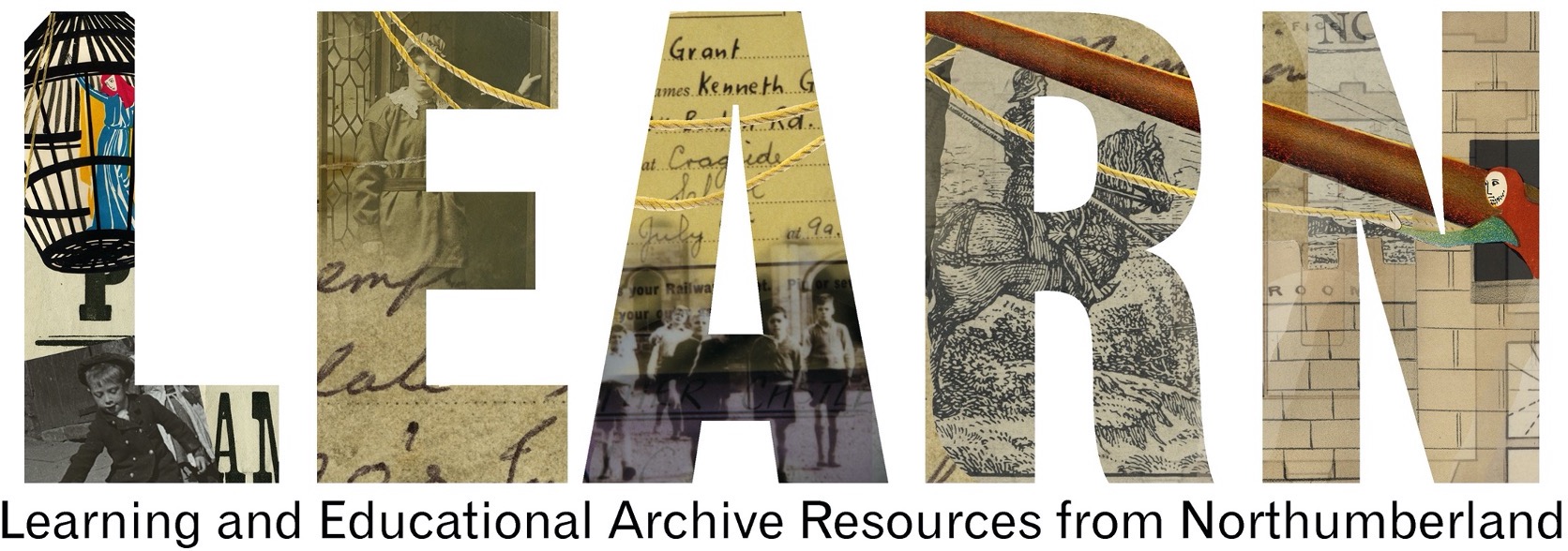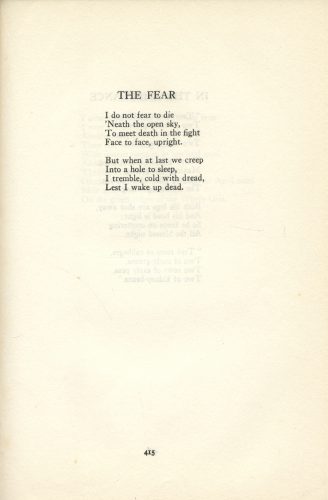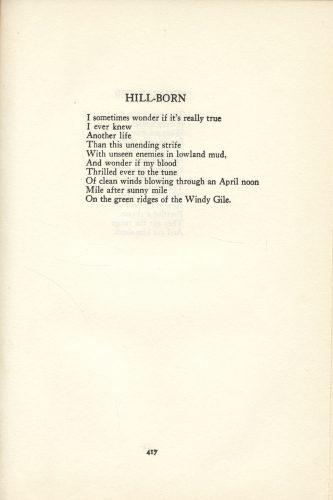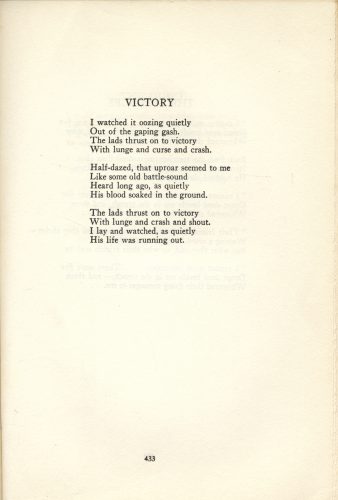The Fear, Hill Born and Victory – Poems by Wilfrid Wilson Gibson
Reference: NRO 01876/P/24/3
Suggested age groups: KS2, KS3, KS4, Lifelong Learners
Subject areas: History, Literacy, Art, Music
CONTEXT
Wilfrid Wilson Gibson was born in 1878 in Hexham. Wilfrid attended local schools, and later said that he wrote his first poem aged 10, about a school bully. He was close to his older sister, Elizabeth, who was also a poet. In 1901, he won a competition to have one of his poems on the base of the fountain in Hexham Market Square.
Wilfrid left Hexham for London in 1912. He lived above the famous “The Poetry Bookshop” and met a group of poets, including Wilfred Owen and Rupert Brooke. During the First World War, Wilfrid tried to join the army on a number of occasions. He was rejected as physically unfit until late 1917 when he enlisted as a Private. Wilfrid did not serve abroad and was not involved in any fighting. However, much of his war poetry is written from the point of view of a soldier in the trenches.
Wilfrid’s book of poetry “Friends”, published 1916, was dedicated to Rupert Brooke (died 1915). The dedication to “Friends” reads:
He’s gone
I do not understand.
I only know
That as he turned to go
And waved his hand
In his young eyes a sudden glory shone:
And I was dazzled by a sunset glow,
And he was gone.
These are three of the poems that he wrote during the First World War, they are part of his “Battle” collection (see British Library link below). “Battle” was an influence on Wilfred Owen who read Wilfrid Wilson Gibson’s poetry while he was being treated for shell shock.
Hill Born
In the poem “Hill Born” the last line mentions “Windy Gile”. This is actually Windy Gyle, a mountain in the Cheviots, Northumberland. Like many poems written by soldiers, there is a sense of yearning for England (although Wilfred never left!). He contrasts the lowland mud of the trenches with the clean winds blowing on a high hill in Northumberland.
ACTIVITIES
ACTIVITY 1
Background
Wilfrid Wilson Gibson was born in 1878 in Hexham. Wilfrid attended local schools, and later said that he wrote his first poem aged 10, about a school bully. Wilfrid left Hexham for London in 1912. He lived above the famous “The Poetry Bookshop” and met a group of poets, including Wilfred Owen and Rupert Brooke. During the First World War, Wilfrid tried to join the army on a number of occasions. He was rejected as physically unfit until late 1917 when he enlisted as a Private. Wilfrid did not serve abroad and was not involved in any fighting. However, much of his war poetry is written from the point of view of a soldier in the trenches.
SEE
See: Where is Wilfrid Wilson Gibson from?
See: When did Wilfrid write his first poem?
See: Which poets did Wilfrid meet in London?
See: Why was Wilfrid rejected from joining the army?
See: Whose perspective is much of Wilfrid’s poetry written from?
THINK
Think: Why does the poet write from the perspective of soldiers in the trenches?
Think: Does knowing that the poet wrote from the perspective of a soldier in the trenches but did not serve abroad or take part in the fighting change the meaning or effect of the poems?
Think: What impression do these poems give you of the war?
Think: How accurately do you think these poems portray war?
Think: How accurately do you think these poems present the experience of the soldier?
Think: Why did war poetry have a sense of yearning for England?
DO
Do: Read some other poems written by poets who served on the front line, for example Wilfred Owen or Siegfried Sassoon. Analyse and annotate these poems to understand the meaning, structure and linguistic devices used by the poets.
Do: Write a statement comparing and contrasting Wilfrid Wilson Gibson’s poetry to the poetry of his contemporaries. Is there a difference in how war and the experience of soldiers is portrayed?
Do: In groups, debate whether or not Wilfrid should have written from the perspective of a soldier in the trenches when he had not experienced it.
Resources
https://www.poetryfoundation.org/poets/siegfried-sassoon
https://www.poetryfoundation.org/poets/wilfred-owen
http://www.warpoets.org/conflicts/great-war/wilfrid-wilson-gibson-1878-1962/
https://www.poetryfoundation.org/poets/wilfrid-wilson-gibson
https://www.bl.uk/collection-items/battle-a-collection-of-poetry-by-wilfrid-wilson-gibson
ACTIVITY 2
Background
These are three of the poems that Wilfrid Wilson Gibson wrote during the First World War, they are part of his “Battle” collection (see British Library link below). “Battle” was an influence on Wilfred Owen who read Wilfrid Wilson Gibson’s poetry while he was being treated for shell shock.
SEE
See: When were these poems written?
See: Which conflict was taking place when these poems were written?
See: Which collection are the poems from?
See: Which other poet did this collection influence?
THINK
Think: Whose viewpoints are these poems told from?
Think: What influenced the poet to write these poems?
Think: What narrative is being told through each poem?
Think: What linguistic features are used to convey meaning in the poems?
Think: What is the form and structure of the poems?
Think: What is the purpose of each poem?
Think: How do the poems affect the reader?
DO
Do: Create a poster illustrating the narrative of each poem. Select key phrases or lines from the poem to include on the poster.
Do: Choose one poem to analyse in depth. Consider the questions from the Think section and use them to help you annotate the poem.
Do: Write a statement about your chosen poem discussing why the poet has chosen each feature to illustrate the meaning of the poem.
Do: Write a monologue from the perspective of the soldier from one of the poems. Expand on what is told in the poem to talk about his experience.
Do: Create a piece of music inspired by the descriptive language in one of the poems.
Do: Write your own poem inspired by Wilfrid Wilson Gibson’s poetry.
Resources
OTHER ONLINE RESOURCES
Wilfrid Wilson Gibson
War Poets website, page for Wilfrid Wilson Gibson: http://www.warpoets.org/conflicts/great-war/wilfrid-wilson-gibson-1878-1962/
Poetry Foundation website, page for Wilfrid Wilson Gibson (includes copies of some poems): https://www.poetryfoundation.org/poets/wilfrid-wilson-gibson
Judy Greenway blog, page about Wilfrid Wilson Gibson (her grandfather): http://www.judygreenway.org.uk/wp/wilfrid-gibson-biographical-information-and-timeline/
Geograph website, photograph of Wilfrid Wilson Gibson’s poem on fountain in Hexham Market Place: https://www.geograph.org.uk/photo/673058,
British Library website, page about “Battle”, a collection of poems by Wilfrid Wilson Gibson: https://www.bl.uk/collection-items/battle-a-collection-of-poetry-by-wilfrid-wilson-gibson
Rupert Brooke
Poetry Foundation website, page about Rupert Brooke: https://www.poetryfoundation.org/poets/rupert-brooke




